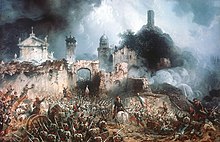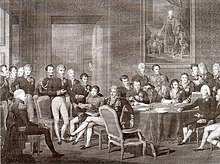Pentarchy (Europe)
Pentarchy ( Greek for rule of five ) describes the flexible, multipolar system of international relations in Europe , which from the end of the 18th century and especially in the 19th century was characterized by the dominance of actually five, at least several powers (“European Concert of Great Powers ”) the equilibrium of forces postulated, striven for or actually prevailing between them . These pentarchy powers included France , Austria , Great Britain , Russia and Prussia .
18th century
As a result of the War of the Austrian Succession and the Seven Years' War , Prussia established itself as the fifth major power in Europe in the 1760s. This ended France's dominant position in Europe since 1659, although it remained the strongest great power. From then on, none of the five powers alone seemed strong enough to dominate the others, which promoted peace in Europe at least until the outbreak of the French Revolution and the Napoleonic Wars . However, the emergence of a real pentarchy was already very controversial in the late 18th century, as the five great powers were not yet on an equal footing. France in particular continued to be by far the strongest military power, while Prussia was clearly the smallest major power. But what shaped the Habsburg-French rivalry up to 1750 was determined by the Austro-Prussian rivalry (German dualism) and the propaganda-based Franco-German enmity for Central Europe from the Renversement des alliances .
19th century
Emergence
One speaks of the European pentarchy as a global political system especially in relation to the first half of the 19th century. What is meant is the so-called Vienna System from 1815 to 1853, which is also called the European Concert of Powers. After the Napoleonic Wars, the four victorious powers agreed on regulations at the Congress of Vienna that were supposed to defend the status quo (the existing order, both internally and externally). First and foremost, the victorious powers Great Britain, Russia, Austria and Prussia thought of a defense against France, in which revolutionary tendencies were still suspected. The conservative eastern powers Russia, Austria and Prussia agreed on a holy alliance to enforce the monarchical principle , in contrast to the modern nation state, as revolutionary France at least propagated it.
However, a system quickly developed in which both France and the four victorious powers, as a so-called pentarchy, preserved the status quo. The aim was to prevent wars between the great powers, but also to ensure that a great power did not expand by conquering and annexing a smaller country in Europe. This would have jeopardized the balance. After all, the pentarchy fought revolutionary, liberal or social uprisings in European countries. The pentarchy thus resembled the German Confederation , which suppressed these movements in Germany.
Examples
- France invaded Spain with troops in 1823 after a rebellion had enforced a constitution in 1821. Spain became an absolute monarchy again.
- In the Orient crisis of 1839–1840, the great powers prevented Egypt from making itself independent from the Ottoman Empire; this had been a goal of France.
- When the southern part of the country seceded from the Kingdom of the United Netherlands during the Belgian Revolution in 1830 , France considered annexing the French-speaking part. Out of consideration for Great Britain, this was not done.
- 1848–1849 Russian troops put down the uprising in Austria-ruled Hungary.
- 1848-1851 Denmark fought against the German national uprising in the duchies of Schleswig and Holstein, which were part of the Danish state ( Schleswig-Holstein War ). Under pressure from Great Britain, Prussia had to end its support for the German movement in the duchies, and the London Protocol (1852) , signed by the five great powers, established the status quo.
- 1863–1864, after the failure of the general state constitution , Denmark included Schleswig under the exclusion of Holstein in the November constitution , thereby violating the provisions on the general state of the London Protocol of 1852, a mediation of the great powers between Denmark and Prussia at the London conference in 1864 failed, the German-Danish war led to a temporary administration of the duchies by the two victors , Austria and Prussia. Prussia annexed the territories in 1866.
End of the system
After the Vienna system had weathered several crises, the Crimean War broke out (1853–1856). It started as another Russo-Turkish war, but then the western powers came to the aid of the Ottoman Empire against Russia. After years of fighting, especially on the Russian peninsula of Crimea on the Black Sea, the war essentially ended with the restoration of the status quo ante. Russia had to forego the Ottoman Danube principalities that had been occupied in the meantime (parts of today's Romania) and accept restrictions on its naval policy.
"The Russian tsar had thus left the concert of the pentarchy and the principle of preserving the status quo, which was concerned by all actors, was abandoned," said historian Harald Kleinschmidt. Above all, the relationship between Austria and Russia was permanently shattered, and the division of the Balkans became a topic of dispute several times. Prussia, on the other hand, had remained neutral during the war, drawing closer to Russia, while the estrangement between Prussia and Austria increased. This would prove significant in later wars. Then around the 1860s there followed three wars between great powers that changed the system of the pentarchy and the political landscape of Europe. With Italy and Germany they created two new nation states. France, Austria and Prussia waged two wars against each other.

The Franco-Austrian War or Sardinian War of 1859 was provoked by Sardinia to liberate parts of Italy from Austrian rule. The ally France finally received Lombardy from the defeated Austria and passed it on to Sardinia. Both France and Austria emerged from the conflict weakened by the costs of the war; however, Sardinia ceded to France Savoy and Nice. France's Emperor Napoleon III. had believed to be able to get the central Italian states under his control, but these joined in 1860/1861 with southern Italy Sardinia. So the new Kingdom of Italy came into being , which France did not necessarily appreciate.
Napoleon III made a similar mistake. 1865, when he encouraged the Prussian Prime Minister Otto von Bismarck to confront Austria. This time, too, he hoped to gain influence over the German states and had assumed that for his benevolent neutrality he would preserve parts of western Germany such as Luxembourg. The Austro-Prussian or German war of the summer of 1866 then ended surprisingly quickly with a victory for Prussia. Prussia then brought all of northern Germany into its sphere of influence through annexation or incorporation into the North German Confederation , and the supposed junior partner Prussia had become France's main opponent.
After several Franco-Prussian diplomatic crises, for example the Luxembourg crisis of 1867, France declared war on Prussia in July 1870. Contrary to France's expectations, the southern German states joined Prussia in the Franco-Prussian War . During the war, these states joined the North German Confederation, so that the German Empire of 1871 came into being.
Within a few years, Prussia-Germany had taken the place of France, as a semi-hegemonic power in Europe between the naval power Great Britain and the land power Russia. Austria became Austria-Hungary through the so-called compromise in 1867 and was at best a secondary great power. At the same time Italy was added as the (sixth) new great power. As a result, different, opposing alliance systems were formed between the great powers.
literature
- Winfried Baumgart : European concert and national movement. International Relations 1830–1878. 2nd Edition. Schöningh, Paderborn, Munich, Vienna, Zurich 2007, ISBN 978-3-506-73726-7 (= Handbook of the History of International Relations. Volume 6).
- Walter Demel : European history of the 18th century. Corporate society and the European power system in accelerated change (1689 / 1700–1789 / 1800). Kohlhammer, Stuttgart 2000, ISBN 978-3-17-014518-4 .
- Heinz Duchhardt : Balance of Power and Pentarchy. International Relations 1700–1785. Schöningh, Paderborn, Munich, Vienna, Zurich 1997, ISBN 978-3-506-73724-3 (= Handbook of the History of International Relations, Volume 4).
- Michael Sheehan: The Balance of Power. History and Theory. Routledge, London, New York, NY 1996, ISBN 978-0-415-11931-3 .
- Arno Strohmeyer : Theory of Interaction. The European Balance of Power in the Early Modern Age. Böhlau, Vienna, Cologne, Weimar 1994, ISBN 3-205-98216-9 .
Individual evidence
- ^ Walter Demel: European history of the 18th century. Kohlhammer, Stuttgart 2000, ISBN 978-3-17-014518-4 , p. 217.
- ^ Winfried Baumgart: European concert and national movement. International Relations 1830-1878 (Handbook of the History of International Relations Volume 6), Paderborn / Munich / Vienna / Zurich 1999 ISBN 978-3-506-73726-7 , p. 147ff.
- ^ Heinz Duchhardt: Balance of Power and Pentarchy. International Relations 1700–1785 (Handbook of the History of International Relations Volume 4), Paderborn / Munich / Vienna / Zurich 1997, ISBN 978-3-506-73724-3 , pp. 10–18.
- ^ Heinz Duchhardt: Balance of Power and Pentarchy. International Relations 1700–1785 (Handbook of the History of International Relations Volume 4), Paderborn / Munich / Vienna / Zurich 1997, ISBN 978-3-506-73724-3 , p. 8f.
- ^ Heinz Duchhardt: Balance of Power and Pentarchy. International Relations 1700–1785 (Handbook of the History of International Relations. Volume 4), Paderborn / Munich / Vienna / Zurich 1997, ISBN 978-3-506-73724-3 , pp. 154f.
- ↑ a b c Harald Kleinschmidt: History of international relations. A system-historical outline . Reclam, Stuttgart 1998, p. 251.

